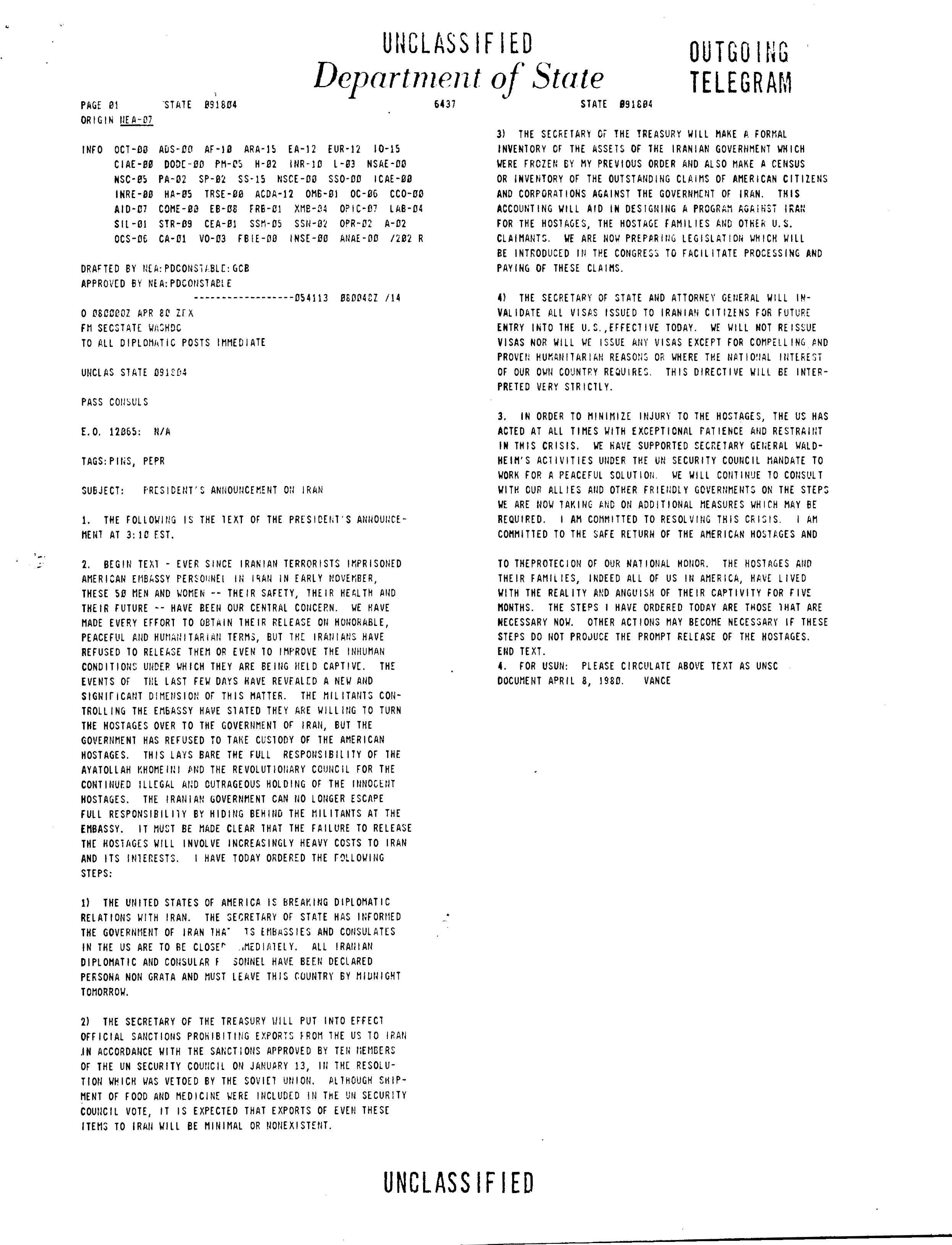Breaking Diplomatic Ties with Iran during the Hostage Crisis, 1980
A Spotlight on a Primary Source by US Department of State
 On April 7, 1980, President Jimmy Carter announced the breaking of diplomatic ties with Iran as a result of the Iran hostage crisis of 1979–1981.
On April 7, 1980, President Jimmy Carter announced the breaking of diplomatic ties with Iran as a result of the Iran hostage crisis of 1979–1981.
The US had first become actively involved in Iran in 1953, when the CIA helped overthrow the country’s prime minister, Mohammad Mossadegh, who implemented legislation to wrest control of Iran’s oil fields from Great Britain. The US supported the return of Iran’s monarch, Mohammed Reza Shah Pahlavi, a brutal dictator who strove to modernize Iran while ruthlessly suppressing his opponents. In 1978, religious leaders, lower- and middle-class Iranians, and the military staged uprisings across the country, forcing the shah to flee on January 16, 1979. On February 1, the Ayatollah Khomeini, an exiled religious leader, returned to Iran, setting up a militant Islamic government and escalating anti-American sentiments.
Later that year, the shah requested permission to be treated for cancer in the United States. Despite his misgivings, President Carter heeded the recommendations of his senior advisors and permitted the shah to enter the country. On October 22, 1979, he arrived in New York, which (as Carter had feared) angered the Iranian revolutionaries. Thirteen days later, protestors stormed the US embassy in the Iranian capital city, Tehran, took sixty-six Americans hostage, and demanded that the shah be extradited. Five women and eight Black men were released in November and another hostage was released in July due to health problems. The remaining fifty-two people spent 444 days in captivity.
The taking of diplomats as hostages shocked the world. The UN stopped short of official sanctions when the Soviet Union vetoed the resolution. The United States attempted to negotiate with Iran and enacted sanctions, including a ban on Iranian oil. In late March 1980, President Carter demanded that the American hostages be turned over to the Iranian government. While the militants said they would be willing to comply, Khomeini decided on April 7 that the hostages would remain in the hands of their captors. That day, President Carter gave a speech outlining the steps the US had taken to resolve the crisis and announcing sanctions and the severing of diplomatic ties with Iran:
Ever since Iranian terrorists imprisoned American embassy personnel in Iran in early November, these 50 men and women—their safety, their health and their future—have been our central concern. We have made every effort to obtain their release on honorable, peaceful and humanitarian terms, but the Iranians have refused to release them or even to improve the inhuman conditions under which they are being held captive. The events of the last few days have revealed a new and significant dimension of this matter. The militants controlling the embassy have stated they are willing to turn the hostages over to the government of Iran, but the government has refused to take custody of the American hostages. This lays bare the full responsibility of the Ayatollah Khomeini and the Revolutionary Council for the continued illegal and outrageous holding of the innocent hostages. The Iranian government can no longer escape full responsibility by hiding behind the militants at the embassy.
The announcement was sent by the State Department in a telegram to US diplomatic posts the next day.
On January 18, 1981, Iran and the United States reached an agreement for the release of the hostages. Complications with the financial arrangements of the deal delayed the release until January 20—a few hours after Ronald Reagan was sworn in as president.
A full transcript is available here.
Excerpt
From US Department of State telegram, “President’s Announcement on Iran,” April 8, 1980.
The Iranian government can no longer escape full responsibility by hiding behind the militants at the embassy. It must be made clear that the failure to release the hostages will involve increasingly heavy costs to Iran and its interests. I have today ordered the following steps:
1) The United States of America is breaking diplomatic relations with Iran. The Secretary of State has informed the government of Iran that its embassies and consulates in the US are to be closed immediately. All Iranian diplomatic and consular personnel have been declared persona non grata and must leave this country by midnight tomorrow.
2) The Secretary of the Treasury will put into effect official sanctions prohibiting exports from the US to Iran in accordance with the sanctions approved by ten members of the UN Security Council on January 13, in the resolution which was vetoed by the Soviet Union. Although shipment of food and medicine were included in the UN Security Council vote, it is expected that exports of even these items to Iran will be minimal or nonexistent.
3) The Secretary of the Treasury will make a formal inventory of the assets of the Iranian government which were frozen by my previous order and also make a census or inventory of the outstanding claims of American citizens and corporations against the government of Iran. This accounting will aid in designing a program against Iran for the hostages, the hostage families and other U.S. claimants. We are now preparing legislation which will be introduced in the Congress to facilitate processing and paying of these claims.
4) The Secretary of State and Attorney General will invalidate all visas issued to Iranian citizens for future entry into the U.S., effective today. We will not reissue visas nor will we issue any visas except for compelling and proven humanitarian reasons or where the national interest of our own country requires. This directive will be interpreted very strictly.
